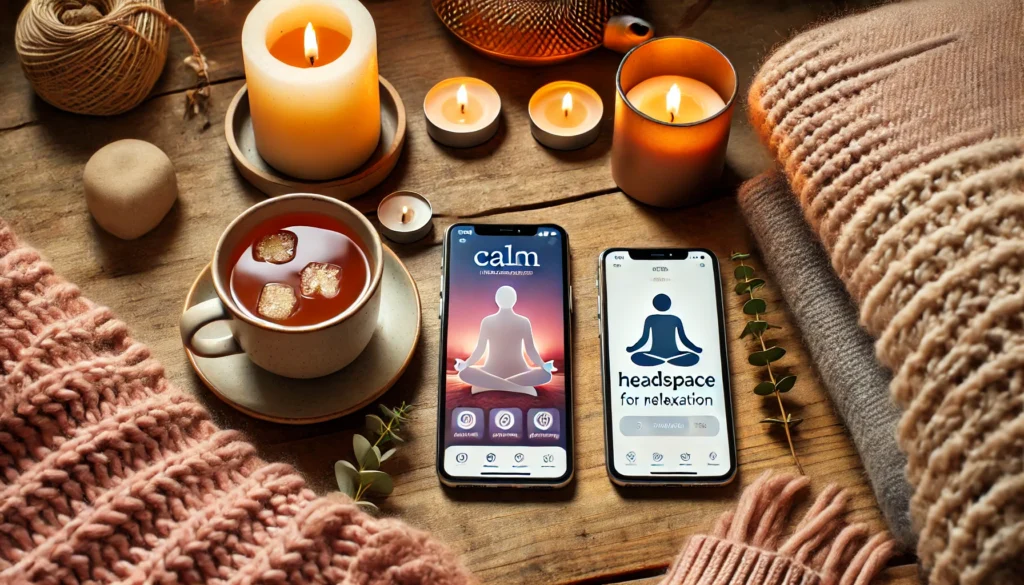Meditation apps have witnessed explosive growth in recent years, driven by increased awareness of mental health and wellness. These digital platforms offer guided meditation, sleep stories, mindfulness exercises, and more, making meditation accessible anytime, anywhere. As stress and anxiety levels rise globally, Calm and Headspace have positioned themselves as leaders in this burgeoning market.
You may also like: Effective Stress Management Techniques for Daily Life
Increased Awareness of Mental Health
The increasing awareness of mental health issues has played a significant role in the popularity of meditation apps. More people are recognizing the importance of mental well-being and are seeking tools to manage stress and anxiety. This shift has opened the door for meditation apps to become integral parts of self-care routines, providing users with accessible and effective solutions for mental health maintenance.
Accessibility and Convenience
The convenience of having a meditation guide in your pocket is unmatched. These apps allow users to practice meditation whenever and wherever they find the time, breaking down the barriers of traditional meditation classes that require a specific time and place. This accessibility is particularly appealing to those with busy lifestyles who may otherwise struggle to incorporate mindfulness into their daily routine.
Global Stress and Anxiety Levels
The global increase in stress and anxiety levels, influenced by factors such as economic uncertainty, social isolation, and fast-paced lifestyles, has prompted many to seek relief through meditation. Calm and Headspace offer tools that are designed to address these challenges, with content specifically aimed at reducing stress and promoting relaxation. As such, they have become go-to resources for individuals looking to alleviate the pressures of modern life.
Calm: A Tranquil Experience
Calm, launched in 2012, offers an extensive library of guided meditations, soothing music, and sleep stories narrated by celebrities. Its user-friendly interface and visually appealing design create a serene experience for users. Calm caters to different needs, offering meditations for stress, anxiety, focus, and gratitude, among others.
Features and Offerings
Calm’s extensive library includes a wide range of guided meditations that cater to various needs, from stress relief to improving focus. The app also offers a rich selection of soothing music tracks and nature sounds designed to enhance relaxation and sleep. Additionally, Calm’s sleep stories, narrated by well-known voices, provide a unique way to unwind and drift into a peaceful sleep.
Unique Selling Points
One of Calm’s standout features is its collection of sleep stories, which are particularly popular among users struggling with insomnia. These stories are carefully crafted to lull listeners into a restful state, combining calming narration with gentle background sounds. Moreover, Calm offers exclusive masterclasses led by experts in the fields of mindfulness and personal development, providing users with deeper insights and practical advice to enhance their meditation practice.
User Experience and Interface
Calm’s interface is designed to be calming and aesthetically pleasing, with gentle nature sounds and tranquil visuals that immediately set a relaxing tone. The app is intuitive, making it easy for users to navigate through its diverse offerings. Users appreciate the seamless experience Calm provides, from exploring content to tracking their meditation progress, making it an enjoyable tool for daily mindfulness practice.
Headspace: Science-Backed Mindfulness
Headspace, founded in 2010, focuses on making meditation simple and accessible. It offers a structured approach to mindfulness, with courses and single meditations tailored to different goals and experience levels. Headspace also provides animations and videos to educate users about meditation and mindfulness concepts.

Features and Offerings
Headspace offers a comprehensive suite of features designed to introduce users to the fundamentals of meditation. Its course-based approach guides users through themed meditation journeys, allowing them to build skills progressively. In addition to guided meditations, Headspace provides mindful workouts, sleep aids, and animations that explain meditation techniques and benefits, making it a versatile tool for overall well-being.
Unique Selling Points
Headspace’s emphasis on scientific research sets it apart. The app collaborates with scientists and universities to validate its effectiveness, and it frequently publishes studies on the benefits of meditation. This scientific backing provides users with confidence in the app’s ability to deliver real, measurable results. Furthermore, Headspace’s structured courses are ideal for beginners seeking a clear and organized path to developing a consistent meditation practice.
User Experience and Interface
Headspace is characterized by its clean, minimalistic design and playful animations that engage users without overwhelming them. The app’s interface is straightforward, ensuring that users can easily find and follow their meditation paths. The design and educational elements combine to create an engaging user experience that keeps users motivated and informed about their mindfulness journey.
Calm vs. Headspace: A Comparative Analysis
Choosing between Calm and Headspace depends on individual preferences and meditation goals. Both apps offer unique features and benefits, catering to different aspects of mindfulness practice. Here’s a closer look at how they compare in various aspects.
Content Variety and Depth
Calm boasts a broader variety of content, with its sleep stories and masterclasses standing out. It’s an excellent choice for users looking for diverse meditation experiences. Conversely, Headspace offers a more structured path with its course-based approach, making it suitable for users who appreciate a clear roadmap in their meditation journey. Calm’s expansive content library appeals to those seeking variety, while Headspace’s focused approach benefits individuals looking for a step-by-step meditation guide.
Scientific Backing
Both apps take the science of meditation seriously, but Headspace’s ongoing research collaborations give it an edge in terms of scientific validation. If evidence-based practice is a priority, Headspace may be more appealing. The app’s commitment to scientific rigor ensures that users can trust the effectiveness of its methods, making it a preferred choice for those who value research-backed mindfulness practices.
Pricing Models
Calm and Headspace both offer free trials and annual subscriptions, with slight variations in pricing. Headspace often provides discounts for students and families, making it a more cost-effective option for some users. Calm, on the other hand, offers lifetime membership options, which can be attractive to those looking for a long-term commitment to their meditation practice. Evaluating pricing models in relation to personal budget and usage frequency can help determine which app offers the best value.
Community Insights: Calm vs. Headspace on Reddit
Reddit is a treasure trove of user experiences and insights. A dive into threads comparing Calm and Headspace reveals diverse opinions. Many users appreciate Calm’s relaxation-centric approach, while others prefer Headspace’s structured courses and scientific grounding. The consensus is that both apps have their strengths, and the choice largely depends on personal preferences and meditation goals.
User Preferences
Reddit users often share personal anecdotes and preferences, providing valuable insights into how each app fits into different lifestyles. Some users praise Calm for its soothing content and ability to help them unwind after a long day, while others find Headspace’s structured approach more conducive to developing a daily meditation habit. These discussions highlight the importance of aligning app features with individual meditation goals and daily routines.
Comparative Feedback
The platform’s threads frequently include comparisons of specific features, such as the effectiveness of Calm’s sleep stories versus Headspace’s sleepcasts. Users also debate the merits of Calm’s visually appealing interface against Headspace’s educational animations. This comparative feedback can be instrumental in helping potential users identify which app’s strengths resonate more with their meditation style and preferences.
Community Support and Interaction
Both Calm and Headspace have active communities on Reddit, where users share tips, challenges, and successes related to their meditation practices. This sense of community can enhance the overall meditation experience, providing support and motivation to stay committed. Engaging with these communities offers users an additional layer of interaction and accountability, fostering a more enriching meditation journey.
Future Trends in Meditation Apps
As the demand for meditation tools continues to grow, we can expect both Calm and Headspace to innovate further. Emerging trends such as personalized meditation experiences, integration with wearable technology, and enhanced AI-driven insights could redefine how users engage with these platforms. Both apps are likely to expand their offerings to cater to evolving user needs and technological advancements.
Personalized Meditation Experiences
The future of meditation apps will likely involve more personalized experiences tailored to individual user needs and preferences. By utilizing data analytics and user feedback, apps like Calm and Headspace can offer customized meditation plans that adapt to a user’s progress and changing goals. This personalization ensures that users receive the most relevant and effective content, enhancing their overall experience.

Integration with Wearable Technology
Integration with wearable devices is another promising trend that could revolutionize meditation apps. By syncing with fitness trackers or smartwatches, apps can provide real-time feedback on metrics such as heart rate and stress levels, allowing users to track their physiological responses to meditation. This data-driven approach can help users understand the impact of meditation on their well-being and encourage more consistent practice.
AI-Driven Insights and Recommendations
Artificial intelligence has the potential to transform meditation apps by offering intelligent insights and recommendations based on user behavior and preferences. AI algorithms can analyze usage patterns and suggest new content or techniques to keep users engaged and motivated. This level of customization can create a more dynamic and interactive meditation experience, catering to the diverse needs of a growing user base.
Practical Advice for Choosing Between Calm and Headspace
When deciding between Calm and Headspace, consider your meditation goals, preferences, and lifestyle. If you enjoy a broad range of content and value relaxation techniques like sleep stories, Calm may be your go-to. However, if you’re looking for a structured, research-backed approach to mindfulness, Headspace might be more suitable.
Assessing Meditation Goals
Begin by evaluating your primary reasons for meditating. Are you seeking stress relief, improved focus, better sleep, or personal growth? Understanding your goals can guide you towards the app that aligns with your objectives. Calm’s diverse offerings may appeal to those with multiple meditation goals, while Headspace’s structured approach can help users achieve specific outcomes through a systematic practice.
Considering Lifestyle and Preferences
Consider how meditation fits into your daily routine and what type of content you find most engaging. If you prefer spontaneous, varied sessions, Calm’s extensive library may suit you. Conversely, if you thrive on routine and enjoy learning through structured courses, Headspace’s methodical approach might be more effective. Your personal preferences for content style and delivery are crucial factors in selecting the right app.
Exploring Free Trials
Both Calm and Headspace offer free trials, providing an opportunity to explore their features without commitment. Take advantage of these trials to experience the apps firsthand, assessing their ease of use, content quality, and overall fit with your meditation goals. This exploration can help you make an informed decision, ensuring that the app you choose becomes a valuable tool in your mindfulness journey.

Conclusion
In the realm of meditation apps, Calm and Headspace stand out for their unique offerings and commitment to enhancing mental health. Whether you lean towards Calm’s tranquil experience or Headspace’s structured mindfulness, both apps provide powerful tools to cultivate a more mindful, peaceful life.
By understanding the nuances of each platform, you can make an informed decision that supports your journey towards greater mental clarity and well-being. As the landscape of meditation apps evolves, embracing these tools can empower you to navigate life’s challenges with calmness and resilience. Whether you’re a seasoned meditator or a curious beginner, the right app can make all the difference in your mindfulness practice.
Further Reading:
Teardown Headspace & Calm Pricing | SBI Growth
The 7 Best Meditation Apps of 2024
Important Note: The information contained in this article is for general informational purposes only, and should not be construed as health or medical advice, nor is it intended to diagnose, prevent, treat, or cure any disease or health condition. Before embarking on any diet, fitness regimen, or program of nutritional supplementation, it is advisable to consult your healthcare professional in order to determine its safety and probable efficacy in terms of your individual state of health.
Regarding Nutritional Supplements Or Other Non-Prescription Health Products: If any nutritional supplements or other non-prescription health products are mentioned in the foregoing article, any claims or statements made about them have not been evaluated by the U.S. Food and Drug Administration, and such nutritional supplements or other health products are not intended to diagnose, treat, cure, or prevent any disease.


